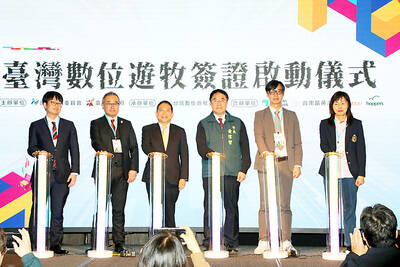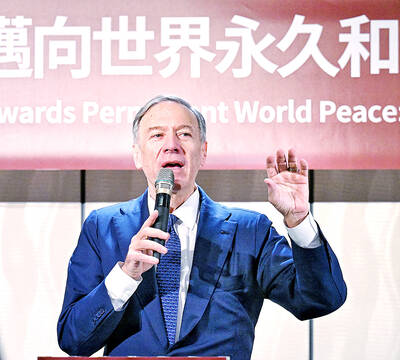An exiled Uighur activist accused China yesterday of trying to use its economic clout to dampen criticism of its human rights record, while Australia's foreign minister said Chinese diplomats who opposed her trip should mind their manners.
Rebiya Kadeer addressed the National Press Club in the capital, Canberra, despite objections by a Chinese diplomat, who the club said made it clear that Beijing did not want her to speak.
She thanked the club for ignoring China's bullying and thanked Australia for resisting “enormous pressure” from Beijing to deny her a visa to visit the country and make a series of public appearances.
China has repeatedly and strongly objected to Kadeer's trip, raising tensions between Canberra and Beijing even as ties are stretched by the case of an Australian mining industry executive being detained in China on suspicion of spying.
Beijing accuses US-based Kadeer of inciting recent riots between Uighurs and members of the dominant Han Chinese group in Xinjiang that killed at least 197 people and injured more than 1,700. She denies it.
In her speech, translated by an aide acting as an interpreter, Kadeer said China had been using its economic clout to try to intimidate nations into softening criticism of its human rights record.
“It is a fact that the Chinese government has been exerting enormous pressure on Western democracies because of its huge trade, in order to dampen down the Uighur and Tibetan issues in all these different countries,” Kadeer said.
China is Australia's largest export market, buying billions of dollars in coal, iron ore and other raw materials each year, and maintaining strong economic ties is in both countries' interests.
Kadeer criticized the Chinese government for its use of its “economic and trading power to threaten other countries and impose its authoritarian will.”
“The international community, Western democracies, should not be intimidated by such threats because China needs them more than the Western democracies need China,” she said, citing China's appetite for Australian raw materials as an example.
Australian Foreign Minister Stephen Smith said earlier that foreign diplomats were entitled to voice the position of their governments on any issue but that they must do so politely.
Beijing's Canberra embassy Political Counsellor, Liu Jing, met management at Canberra's National Press Club last week and requested they withdraw an invitation for Kadeer to speak, the club said.
“Embassies, diplomats, officials are entitled to put views in Australian society, but when they put those views, those views have to be put appropriately,” Smith told state radio.
Liu told the press club it would be “regrettable” if diplomatic relations between Australian and China were harmed by Kadeer speaking there, club chief executive Maurice Reilly said.
“The press club and the board have a long-standing policy of 40 years or more that they decide who speaks at the press club, and they are quite free of outside influence,” said Reilly, confirming Liu's approach.
“We listened respectfully and we pointed out that China has a different social system to our social system,” Reilly said.

ANNOUNCEMENT: People who do not comply with the ban after a spoken warning would be reported to the police, the airport company said on Friday Taoyuan International Airport Corp on Friday announced that riding on vehicles, including scooter-suitcases (also known as “scootcases”), bicycles, scooters and skateboards, is prohibited in the airport’s terminals. Those using such vehicles should manually pull them or place them on luggage trolleys, the company said in a Facebook post. The ban intends to maintain order and protect travelers’ safety, as the airport often sees large crowds of people, it said, adding that it has stepped up publicity for the regulation, and those who do not comply after a spoken warning would be reported to the police. The company yesterday said that

QUIET START: Nearly a week after applications opened, agencies did not announce or promote the program, nor did they explain how it differed from other visitor visas Taiwan has launched a six-month “digital nomad visitor visa” program for foreign nationals from its list of visa-exempt countries who meet financial eligibility criteria and provide proof of work contracts. To apply, foreign nationals must either provide proof that they have obtained a digital nomad visa issued by another country or demonstrate earnings based on age brackets, the Bureau of Consular Affairs said. Applicants aged 20 to 29 must show they earned an annual salary of at least US$20,000 or its equivalent in one of the past two years, while those aged 30 or older must provide proof they earned US$40,000 in

UNITY MESSAGE: Rather than focusing on what Trump said on the campaign trail about Taiwan, Taipei should be willing to engage with the US, Pompeo said Taiwan plays a key role in Washington’s model of deterrence against China, former US secretary of state Mike Pompeo said in a speech in Taipei yesterday. During US president-elect Donald Trump’s first term, “we had developed what we believe was a pretty effective model of deterrence against adversaries who wanted to undermine the set of rules and values that the people of Taiwan and the people of the US hold dear,” Pompeo said at a forum organized by the Formosa Republican Association. “Succeeding in continuing to build this model will not solely rest at the feet of president Trump and his team,
TECH CORRIDOR: Technology centers and science parks in the south would be linked, bolstering the AI, semiconductor, biotech, drone, space and smart agriculture industries The Executive Yuan yesterday approved a “Southern Silicon Valley” project to promote the development of an artificial intelligence (AI) and semiconductor industry in Chiayi County, Tainan, Pingtung County and Kaohsiung. The plan would build an integrated “S-shaped semiconductor industry corridor” that links technology centers and science parks in the south, Executive Yuan spokesperson Michelle Lee (李慧芝) said yesterday after a Cabinet meeting. The project would bolster the AI, semiconductor, biotech, drone, space and smart agriculture industries, she said. The proposed tech corridor would be supported by government efforts to furnish computing power, workforce, supply chains and policy measures that encourage application and integration